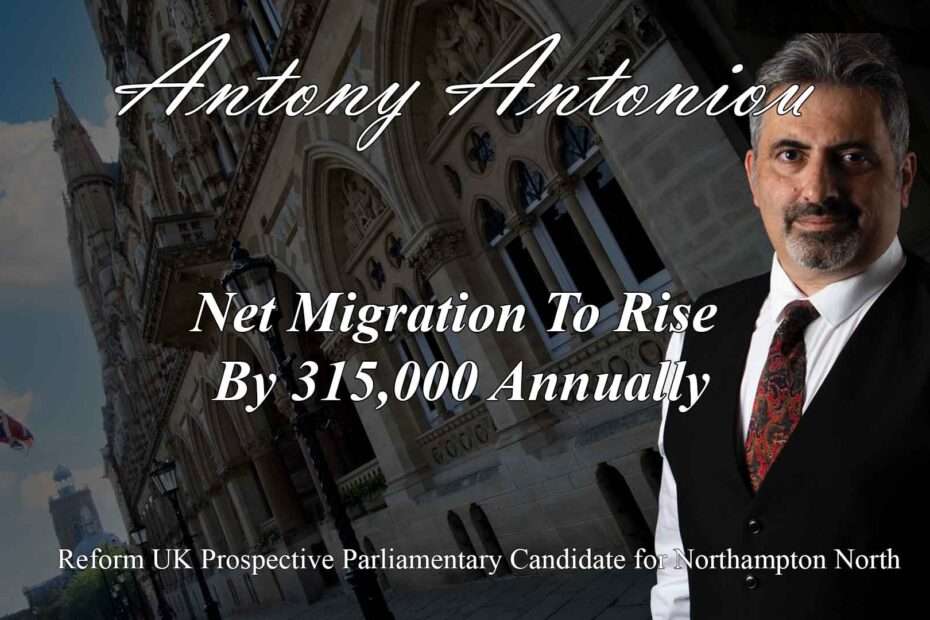Net Migration To Rise By 315,000 Annually
Immigration Figures Spark Concern Over Government’s Approach
Net Migration Set to Rise by Over 300,000 Annually
Britain’s immigrant population is projected to surge by a staggering 315,000 annually over the next five years, according to official forecasts from the Office for Budget Responsibility (OBR). This influx is equivalent to the population of a city the size of Doncaster arriving each year, raising concerns about the government’s ability to manage immigration effectively.
Rwanda Bill Faces Repeated Setbacks
Amidst this looming increase in net migration, the government’s Rwanda Bill suffered yet another five defeats in the House of Lords last night, bringing the total number of setbacks to 10. The Bill, designed to deport illegal immigrants to Rwanda, has faced significant opposition from peers across the political spectrum, including Conservative members, as well as Labour and Liberal Democrat representatives.
Contradictory Statements on Immigration
The projected surge in net migration appears to contradict statements made by Chancellor Jeremy Hunt during the recent budget, where he repeatedly asserted the government’s intention to reduce migration and move away from an economy reliant on increased immigration to drive GDP growth. Instead, Hunt emphasized the need to focus on boosting GDP per capita, acknowledging that while the country’s overall wealth has been increasing, its distribution among the population has remained stagnant, potentially leading to a decline in individual prosperity.
The Impact of Immigration on Economic Prosperity
The significance of GDP per capita figures, is that as more people arrive in the country, unless they are net contributors, the existing wealth must be shared among a larger population, effectively making individuals poorer. Recent Dutch data that examined tax contributions by migrant origin, revealed that individuals from East Asia, Europe, and the Anglosphere tend to be net tax contributors, while those from the Middle East, North Africa, and sub-Saharan Africa are more likely to be net tax burdens over their lifetimes.
This disparity is down to the strength of education, health systems, and civil governance in the countries of origin, enabling immigrants from those regions to potentially make greater economic contributions. The “arrogant liberal assumption” that secular education and material redistribution can transform any individual from any background into an equally contributive citizen, suggesting that the reality is more nuanced.
The Importance of Low-Skilled Labor
While acknowledging the value of low-skilled labor, such as bin collectors and street sweepers, Tomlinson argued that importing individuals for low-income jobs, who often bring their families, places additional burdens on public services like schools, healthcare, transportation, and housing. Unless these individuals are net contributors, which is often not the case, their presence can strain the nation’s resources.
Historical Context and Lack of Growth
Despite assurances from successive governments, notably under Tony Blair’s leadership, that immigration would foster economic growth, T growth has remained relatively stagnant, even during periods of high immigration from Eastern Europe. The peak of immigration under the Blair and Brown years, around 2010-2011, when figures reached approximately 383,000, highlighting that the current Conservative government’s projections exceed even those levels.
Concerns Over Data Transparency
We should be concerned by the government’s decision to stop collecting data on tax contributions by national origin, a move that is motivated by a desire to suppress information that contradicts the narrative of immigration being an “unmitigated good.” This lack of transparency raises questions about the government’s commitment to making informed, data-driven decisions on immigration policy.
The Rwanda Bill: A “Dead Cat Distraction Strategy”?
While the government has focused heavily on combating illegal migration through the controversial Rwanda Bill, former Immigration Minister Robert Jenrick described the policy as a “dead cat distraction strategy” that was never intended to work. As the Bill continues to face opposition in Parliament, some have questioned whether it serves as a diversion from the government’s failure to address legal immigration effectively.
Calls for Domestic Skill Development
In response to the projected increase in net migration, Philip Ingram, a military veteran, emphasised the need for the government to prioritise domestic skill development, questioning why the UK seemingly struggles to train enough citizens to fill crucial roles, such as doctors. He suggested that relying heavily on imported labor is insulting to the capabilities of the British workforce.
Conclusion
As the debate over immigration policy intensifies, the government faces mounting pressure to reconcile its stated objectives with its actions. The projected surge in net migration, coupled with the repeated setbacks to the Rwanda Bill and concerns over data transparency, have fueled skepticism about the government’s commitment to managing immigration effectively. Addressing this challenge will require a comprehensive strategy that balances economic needs with social and cultural considerations, while fostering domestic skill development and ensuring transparency in decision-making processes.
We can only assume that this administration, as well as previous administrations have been party to a campaign of deceit, which has been executed against the British people, against their will and to their detriment.
Although the total GDP may appear to rise as the population increases, the reality is that we have so many immigrants who ARE NOT net contributors, but are in fact a NET LOSS, that the reality has been that for SEVEN QUARTERS IN SUCCESSION the GDP per capita, that is the total GDP divided by the population has actually been falling. Therefore, immigration is making us poorer, it is causing a severe strain on our essential services, we already struggle to build enough houses for the existing citizens of the United Kingdom, but there is absolutely no way that we could build houses fast enough to deal with six and seven figure immigration.
The response to this is always the same narrative, Xenophobia and Racism.
We need Reform and we need it NOW!

